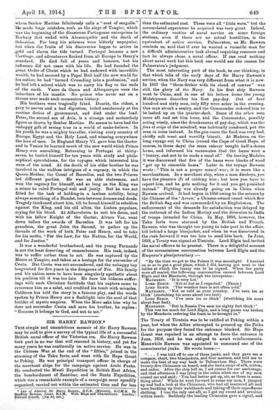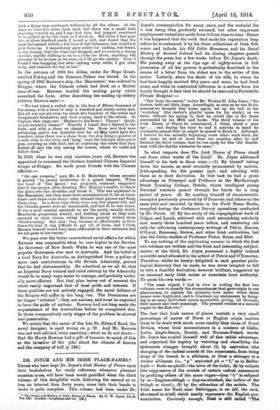SIR HARRY RAWSON.* Tam simple and unambitious memoir of Sir
Harry Rawson may be said to give a survey of the typical life of a successful British naval officer of the Victorian era. Sir Harry Rawson took- part in no war that will resound in history, and yet for many years he was 'continually on active service. He was in the Chinese War at the end of the " fifties," joined in the storming of the Taku forts, and went with Sir Hope Grant to Peking. He was principal transport officer in charge of the merchant ships for the campaign against Arabi Pasha. He conducted the Mweli Expedition in British East Africa, the bombardment of Zanzibar, and the Benin Expedition, which was a remarkable example of a campaign most speedily organized, carried out within the estimated time and for less
• Ly's of Admiral Sir Harry Ramon, G.C.B. (Mt2itary), G.O,M.G. By
Geoffrey Rawson, Lieut. With Maya and Illustrations. London lgdward Arnold. [hi. 6d. nett. . .
than the estimated coat. These were all "little wars," but the accumulated experience be acquired was very great. Indeed, the ordinary routine of naval service on some foreign stations, even if there are no actual hostilities, is the equivalent of active service. Palmerston, as Mr. Rawson reminds us, said that if ever he wanted a versatile man for a difficult administrative task abroad requiring resource and tact he always chose a naval officer. If one read nothing about naval work but this book one would see the reason for Palmerston's judgment.
The most interesting part of the book, to our thinking, is that which tells of the early days of Sir Harry Rawson's service, when the Navy was very different from what it is now. In 1857 the "three-decker with its cloud of canvas" was still the glory of the Navy. In his first ship Rawson went to China, and in one of his letters home the young Midshipman describes his first pay-day. Out of four hundred and sixty men, only fifty were sober in the evening. One man struck a sentry, and the Commander ordered him to be lashed np on the quarter-deck. Some of the other men came aft and set him loose, and the Commander, possibly acting wisely, since the drunkenness of pay-day, which was the fens et origo of the mischief, was habitually condoned, put the man in irons instead. In the gun-room the food was very bad. chiefly salt meat and weevilly biscuit. At Madeira on the long voyage out to China (round the Cape of Good Hope, of course, in those days) the mess caterer bought half-a-dozen hams, and informed his messmates that the hams were a " luxury, and not to be made a meal of." On leaving Madeira it was discovered that five of the hams were blocks of wood "got up to resemble hams." Later in the voyage Rawson wrote : "This is not a proper man-o'-war; it is more like a merchantman. In a merchant ship, when a man disobeys, you have the pleasure (?) of cobbing him ; but here you have to report him, and he gets nothing for it and you get punished instead." Fighting was already going on in China when Rawson arrived. It had begun in 1856 owing to the seizure by the Chinese of the' Arrow,' a Chinese-owned vessel which flew the British flag and was commanded by an. Englishman. The enforcement of the demands for satisfaction was delayed by the outbreak of the Indian Mutiny and the diversion to India of troops intended for China. In May, 1858, however, the Taku forts were stormed by the British and French. Rawson, who was thought too young to take part in the affair, hid behind a large bluejacket, and when be was discovered in the rush forward it was too late to send him back. Is. June, 1858, a Treaty was signed at Tientsin. Lord Elgin bad invited the naval officers to be present. There is a delightful account of the ceremonious conversation between Lord Elgin and the Emperor's plenipotentiary :-- "By the time we got to the Palace it was moonlight. I hurried on so as to get a good place, which I did, having got next to the tables at which the treaty was to be signed. When the party were all seated, the following conversation ensued between Lord Elgin and the Mandarin, through the interpreter: MANDARIN. It is very hot.'
Loan Mem. 'Not so hot as I expected.' (Pause.) LORD ELGIN. 'The weather here is not often cold.'
MANDARIN. 'Not so cold as your country. I've Been ice so thick' (stretching his arms about two feet). Loan ELGIN. 'I've seen ice so thick' (stretching his arms about four feet).
Maspasts. 'But in Russia I've seen ice eighty feet thick!' This was too much for Lord Elgin, and a long pause was broken by the Mandarin ordering the feast to be brought in."
The Treaty of Tientsin was to be ratified at Peking within a year, but when the Allies attempted to proceed up the Peiho for the purpose they found the entrance blocked. Sir Hope Grant was repulsed in an attempt to force the entrance in June, 1859, and he was obliged to await reinforcements. Meanwhile Rawson was appointed to command one of the commissariat junks. He wrote home :— ". . . I was told off to one of these junks, and they gave me a compass, chart, two bluejackets, and four marines, and told me to make the best of my way back to Talienwhan Bay. There were twenty-five Chinamen on board, and she hada cargo of silk, cotton, and calico. After the ship left us, I set course for our anchorage; and-that afternoon I was lying in the cabin when one of my men roused me and said: You had better get up, sir, as there is some.. thing afoot.' While he went forward to rouse my men, I jumped up and had a look at the Chinamen, who had all mustered at and were buckling up their waistbands and takingoff their superfluous clothing. I was the only one aft, so I got my sword and revolver within reach. Suddenly the leading Chinaman gave a signal, and took a flying leap overboard, followed by' all the others. At the time we were five miles from land, but there was a small junk standing towards us, and I saw that they had jumped overboard to be picked up by this boat, so I stood on. But when I had gone two or three hundred yards, I heard a yell, and 'found that the junk had passed within a few feet of the Chinamen, but would not pick them up. I immediately gave orders for tacking; but found, to my dismay, that the wind had dropped, and we were in a strong current, rapidly drifting us on to a rocky lee shore, anything but pleasant to be as near as we were, so I let go the anchor. SoOn I found I was dragging, but after nutting away cable; I got clear away, and reached the bay at last."
lu the autumn of 1860 the Allies, under Sir Hope Grant, reached Peking and the Summer Palace was looted. In the spring of 1862 Rawson's ship, the 'Encounter,' was ordered to Ningpo, where the Chinese rebels had fired on a British man-of-war. Rawson headed the coaling party which assaulted the forts. After describing the' scaling up rickety ladders, Rawson says :--
" We had taken a walled city in the face of fifteen thousand of the enemy with a force of only a hundred and ninety-seven men. But all was not yet over, for about five, hundred of the rebels had reorganized themselves and were coming back to the attack. So Captain Dew sings out: 'Marines to the front ! Charge ! Quick, or you haven't a chance!' Directly I beard this I dashed to the front, and with a cheer we charged 'em. Even now they were advancing, and it was doubtful how far we fifty could fight five hundred, when there was a cheer from the ship lying a quarter of a mile away in the river, and 'bang' went the ten-inch after-pivot gun, covering us with dust, but so confusing the rebels that they bolted off into the city among the houses, where we could not follow them."
In 1863, when be was only nineteen years old, Rawson was appointed to command the thirteen hundred Chinese Imperial troops at Ningpo. lie made great friends with the Chinese officials:— "On one occasion," says Mr. A. D. McArthur, whose' account is quoted, "he issued invitations to a. grand banquet. When the toast of 'The Queen' was proposed, someone suggested that it was proper, after drinking Her Majesty's health, to throw the glass over the shoulder and break it. This was explained to the Mandarins, but they must have misunderstood it, for at every toast—and there were many—they drained their glasses and flung them away. In a short time there were very few glasses left, and the Chinese guests Were all intoxicated, and had to be Sent home. It was a most comical spectacle to see the portly, usually stolid, Mandarins gorgeously attired, and bobbing about as. they were escorted to their chairs, whilst Rawson gravely wished them 'Good-evening.' But alas ! they became so affectionate in their farewells that it was difficult to get rid of them, and I think Rawson himself would have been suffocated in their embraces had we not gone to his rescue."
We pass over the better remembered naval affairs for which Rawson was responsible when be rose higher in the Service. As Governor of New South Wales he was one of the most popular Governors ever sent to Australia. And his belief in a local Navy for Australia, as distinguished from a policy of mere cash contributions to the British Admiralty, proved that he had statesmanship. He admitted, as we all do, that an Imperial Navy trained and ruled entirely by the Admiralty would be in many ways easier to manage, andprobably tactic- ally more efficient. But that plan leaves out of account the whole vastly important fact of local pride and interest. If these qualities are not actively engaged, the naval defence of the Empire will suffer in the long run. The Dominions are no longer "colonies" ; they are nations, and must be expected to have the pride of nations. Rawson had not long made the acquaintance of the Australians before be recognized this. In those comparatively early stages of the problem he showed real penetration.
We notice that the name of the late Sir EdWard Reed, the naval designer, is spelt wrong on p. 39. And air. Rawson was not well advised, when asserting—What we do not doubt— that Sir Harry Rawson hatta gift of humour, to speak of him as the inventor- of the joke about the climate of heaven and the company of hell (p; 2444.)











































 Previous page
Previous page